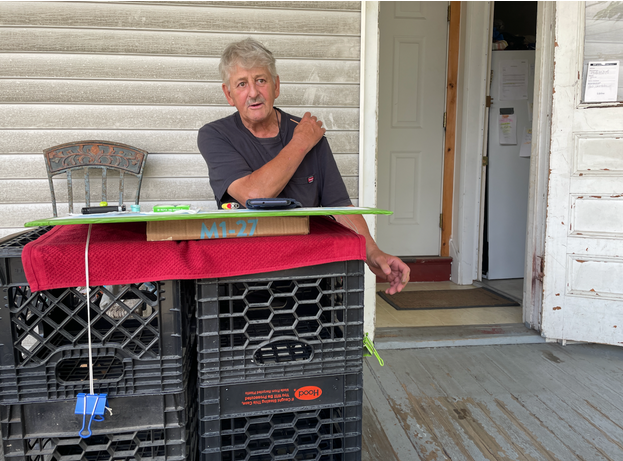Ghost story
2023-08-19
Dear friend,
This wouldn’t be a ghost story if it had a solid conclusion. But I pray you heed it well.
Meet Don. Don’s third floor is haunted.
“Usually she says, ‘Get out of my house,’” Don explains to me, with more profanity than I’m quoting here.
It wakes Don up when she yells, frustrates him when she leaves silverware in the microwave.
Why do ghosts frustrate us?
Perhaps they are a mirror from another dimension. I'm haunted by a fear that I'll miss the call for help issued by a loved one, or maybe that my call will be missed. I came upon my ghost honestly, and I'm trying to give it a peaceful rest. Sometimes by finding clues where others are haunted. Something drew me to Don’s front step the other day in Barre.
Don’s been putting up with the ghost for a year-and-a-half. He’s researched the home’s industrial past for clues, but hasn’t found much.
One thing stands out, though.
“She helped me one time,” Don said.
A woman was trying to get over a hump in the sidewalk with her cart. Don lent a hand but wasn’t strong enough.
“Then I felt her hand on my shoulder,” he said, referring to the ghost. “We pushed and got this lady across,” he said. “Then I turn around, and she’s gone.”
What if that’s all she ever wanted? To help—maybe to have a purpose. Maybe to be asked if she needs anything.
“Then I felt her hand on my shoulder,” said Don, about his home’s ghost.
That’s my conclusion, not Don’s. He was painting a colorful landscape as we spoke, not venturing any theories. But he gave me some sense of direction. In a world where it’s easy to lose patience, in a country where people are killing themselves and engaging in risky drug use at astronomical rates, helping each other connects us and harnesses our energy.
We could use more reaching each other with the right help. We could use more ghost prevention.
A friend checked herself into the psychiatric hospital earlier this year for acute depression and suicidal ideations.
“Why didn’t you tell us how bad you felt?” asked family members after she came out. “Why didn’t you ask for help?”
If only it were so easy.
When I sat down for the intake at a recent appointment, about all I could get out of my mouth was, “I feel bad.”
“Can you tell me more?” the acupuncturist said.
“I feel really bad,” I said. I felt frustrated that he wanted my words when all I wanted was for him to get the reading directly from my body, taking the pulses of Chinese medicine off my wrist. If I knew more about my badness, maybe I wouldn’t need to be at the acupuncturist's.
If I knew the exact way in which I could use help, maybe I’d know just the right words to use when reaching out. But since I don’t think I’m alone in not always knowing how to ask for what I need, I’m also trying to develop the complementary body part—my ear.
How many times am I put off by something someone says to me, when perhaps they’re asking for help, in a confusing way?
For things like suicide hotlines to work more often, someone has to have the thought, “I bet if I share my most desperate thoughts, which I have a hard time saying out loud, a stranger on a toll-free line can help me.”
And they can help you. Please do call 988. Or text “VT” to 741741 for crisis support via text. If you’re reluctant to do so, if you feel alone and hopeless that anyone can understand, I can relate. Reaching out takes a leap of faith.
Often, the call goes out but in a wordless way. I remember times I dropped off the map, not because I wanted to be off the map but because I wanted to see if anyone noticed.
A lot of people who drop off the map do it louder the next time, shouting where they first whispered.
Tomorrow’s ghosts will make us crazy because today we are hearing a message we don’t know how to heed.
When I hear from a part of myself, or anyone else, and it doesn’t make sense to me, I try to keep listening until I can make a connection. One I’m puzzling on at the moment is someone I’ll call Nancy. I met her the other day in her unit at Chittenden Regional Correctional Facility in South Burlington.
As is common, Nancy’s been in and out of Vermont’s prison for women several times. Like over 60% of incarcerated persons in Vermont, Nancy is addicted to a substance, one that she was exposed to at a young age by the adults around her. She’s able to access a non-lethal version of that substance while in prison but is very likely, upon being released, to access and then die from the more potent and lethal street version.
I hope that Nancy herself, and everyone like her, will get clean and live a long and healthy life. But statistically, a woman in her position is a ghost of tomorrow, walking today.
Her story is easily dismissed as that of another drug user. But what if we listened better to her? What is she saying? What does she need—not just to be free, but to thrive?
Warm regards,
Tristan Roberts
Quill Nook Farm



